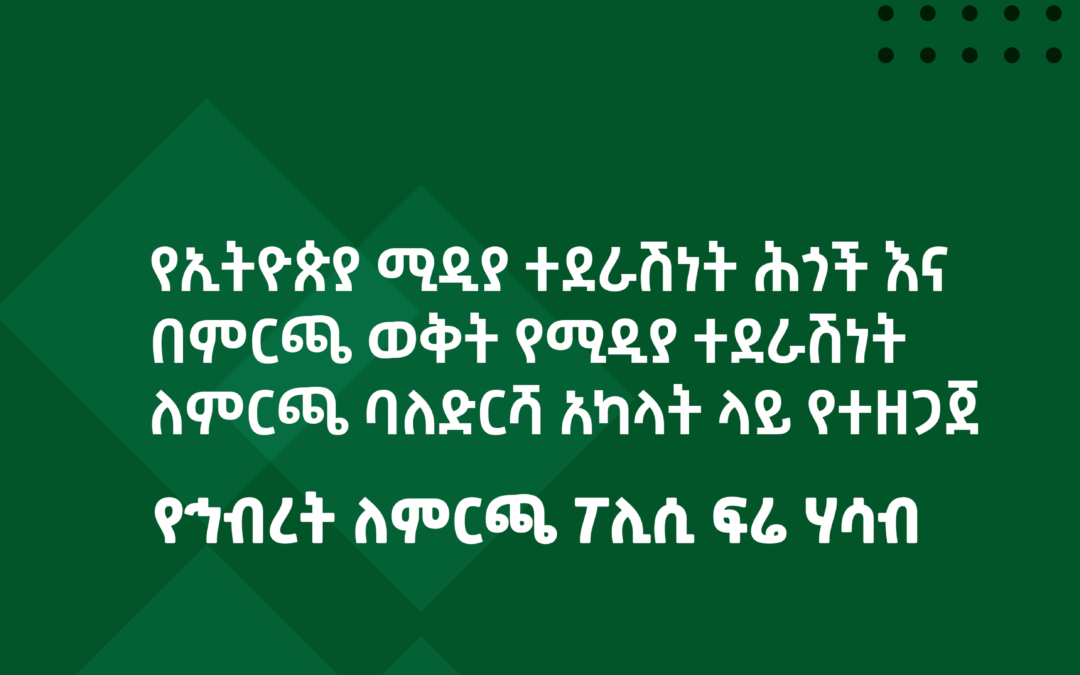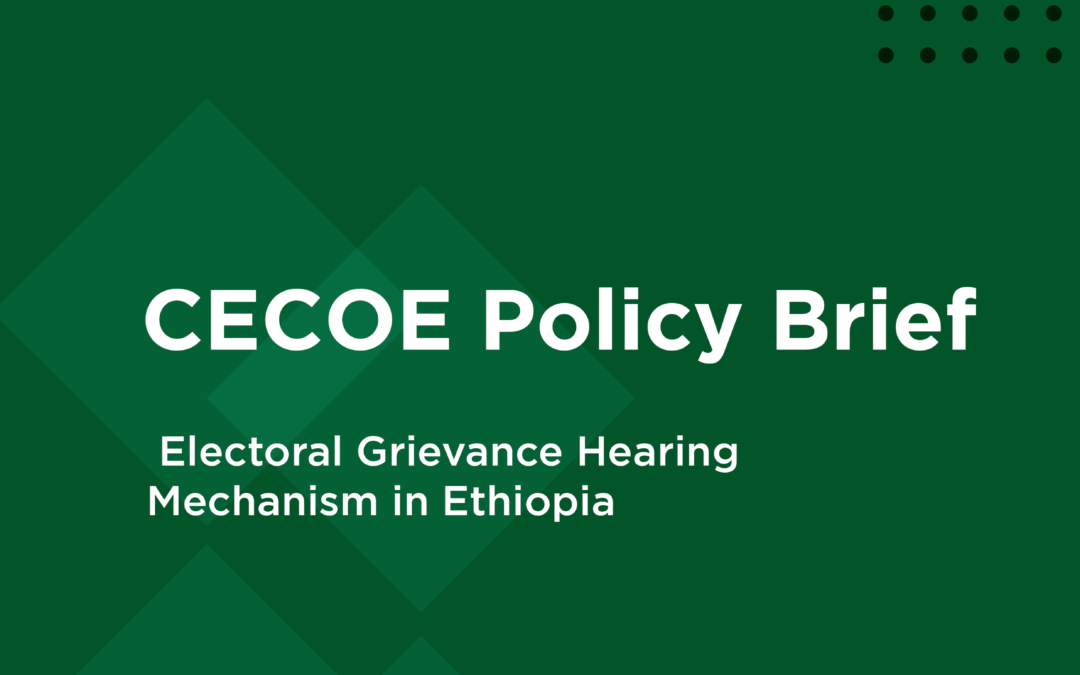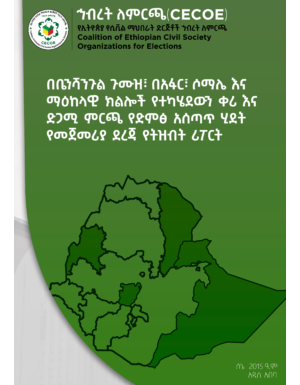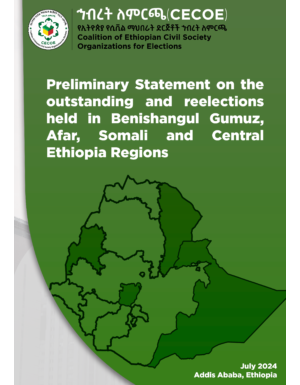
Oct 13, 2023
ከምርጫ ጋር በተገናኘ የሚነሱ ቅሬታዎችን በወቅቱ እና በአግባቡ ለመፍታት የምርጫ ቅሬታ ሰሚ ኮሚቴዎችን (Grievance Hearing Committees) በተፈላጊው መጠን መመስረት እና ተግባራዊ እንዲሆኑ ማድረግ ወሳኝ ነው። የእነዚህን ኮሚቴዎች ውጤታማነት እና ቅልጥፍና ማረጋገጥ የተግባራዊነት መስፈርቶችን ከአቤቱታ አቅራቢዎች መብት ጋር የሚያመዛዝን ተግባራዊ የህግ ማዕቀፍ ማውጣትን ይጠይቃል። የኢትዮጵያ ምርጫ አዋጅ እና ቅሬታ ሰሚ ኮሚቴዎች ማቋቋሚያ እና አሰራር መመሪያ ቅሬታ ሰሚ ኮሚቴዎች በምርጫ ጣቢያ፣ በምርጫ ክልል እና በክልል ቅርንጫፍ ጽህፈት ቤቶች ደረጃ ባሉ የምርጫ አፈጻጸም መዋቅሮች ላይ ሶስት ሶስት አባላት ያሏቸው የቅሬታ ሰሚ ኮሚቴዎችን ያቋቋማሉ።
ብሔራዊ ምርጫ ቦርድ (ቦርዱ) በህግ የተቋቋሙትን ኮሚቴዎች በአግባቡ መጠቀም አለመቻሉን የኅብረት ለምርጫ የስድስተኛው ጠቅላላ ምርጫ ትዝብት ሪፖርት ያሳያል። በዚህም የተነሳ ቅሬታ አቅራቢዎች (መራጮች፣ የፖለቲካ ፓርቲዎች እና ሌሎች) ከሕግ ውጪ ለሆኑ አሰራሮች እንደተጋለጡ የኅብረት ለምርጫ ትዝብት ያመለክታል። በስድስተኛው ጠቅላላ ምርጫ ድምጾችን ከማጣራት እና ከመቁጠር ጋር የተያያዙ ቅሬታዎች፣ የፖለቲካ ፓርቲ ተወካዮችን ፣የፓርቲ ተወካዮችን ከምርጫ ቆጠራ ሂደት ማባረር፣ መራጮችን ማስፈራራት፣ የገዥው ፓርቲ አባላት ጣልቃ ገብነት፣ በተንቀሳቃሽ የምርጫ ታዛቢነት እንዳይሳተፉ በባለሥልጣናት/ በአስተዳዳሪዎች መገደብ የመሳሰሉት ቅሬታዎች ቀርበው ነበር።
ይህ የፖሊሲ ፍሬ ሃሳብ በፖሊሲ አውጪዎች በተለይም ቦርዱ በኢትዮጵያ የምርጫ ቅሬታ አሰማም ዘዴ ላይ የፖሊሲ ማሻሻያ ለማድረግ አሳማኝ ሃሳብ ለማቅረብ ያለመ ነው። በዚህ ሰነድ ለብሔራዊ ምርጫ ቦርድ፣ ለፖለቲካ ፓርቲዎች እና ለሲቪል ማህበራት ድርጅቶች የተለያዩ ምክረ-ሃሳቦች ተሰጥተዋል። በዚህም መሰረት ቦርዱ አሁን በሕግ የተደነገገው የምርጫ ቅሬታ አሰማም ሂደት ካሉበት ተግባራዊ ውሱንነት አንፃር በማሻሻል የቅሬታ አሰማም ሂደቶች ተግባራዊ መሆናቸውን ሊያረጋግጥ ይገባል። ፖለቲካ ፓርቲዎች ቅሬታቸውን በሚያቀርቡበት ጊዜ ሁሉንም የሕግ እና የተቋም መስፈርቶች የሚከተሉ እንዲሆኑ አቅማቸውን ማሳደግ። በተጨማሪም የሲቪል ማህበራት ድርጅቶች የቅሬታ ሰሚ ኮሚቴዎች አባላትን በመመልመል እና በማሰልጠን ለምርጫ ቦርድ ድጋፍ ማድረግ አለባቸው። ከዚህም ባለፈ የሲቪል ማህበራት ድርጅቶች የኢትዮጵያ የምርጫ ቅሬታ አሰማም ዘዴ ሕግን የሚመለከቱ ስልጠናዎችን ለፖለቲካ ፓርቲዎች መስጠት አለባቸው።

Oct 13, 2023
The establishment and functionality of Grievance Hearing Committees (GHCs) is crucial for the timely and appropriate resolution of electoral complaints in every election. Ensuring the effectiveness and efficiency of these GHCs requires putting in place a practical legal framework that balances operational requirements along with the rights of complainants. The Ethiopian election proclamation and the GHCs establishment and operation directive indicate that GHCs are to be established in polling stations, constituencies and regional branch offices with each committee comprising three members.
CECOE’s observation of the Sixth General Elections identified that the NEBE was not able to effectively utilize the legally established GHCs. As a result of this, CECOE has gathered that irregularities were faced by complainants (voters, political parties and others). During the Sixth General Elections, complaints related to counting and tabulation of votes, denial of access to political party agents, dismissal of party agents from the counting process, voter intimidation, interference by ruling party members, and limitation posed by authorities to engage in mobile election observation were some of the instances for submission of complaints.
This policy brief is prepared with the aim of presenting an argument to initiate policy reform discussions among policymakers, more specifically the NEBE, on the Electoral Grievance Mechanisms in Ethiopia. It presents the recommendations to the NEBE, political parties, and civil society organizations (CSOs).

Aug 2, 2023
ይህ የፖሊሲ ማብራሪያ በመገናኛ ብዙሃን እና በምርጫ መካከል ያለውን ግንኙነት አስፈላጊነት ከግምት ውስጥ በማስገባት በኢትዮጵያ 6ተኛው ጠቅላላ ምርጫ ዙሪያ ያሉትን ተግዳሮቶች፣ አንድምታዎች እና ተስፋዎች እና የመገናኛ ብዙሃን የተለያዩ የምርጫ ባለድርሻ አካላትን ተደራሽነት ይዳስሳል። ከዚህ ባለፈም የሚዲያ ተቋማት የጋዜጠኝነት ሞያ ስነ-ምግባር አክብረው በምርጫው ሂደት ላይ ሚዛናዊ ሽፋን መስጠት እንዳለባቸው ያትታል። በተጨማሪም የመራጮች ትምህርት የሚዲያ ሽፋን ማሳደግ እና ሴቶችን ጨምሮ ሁሉም ባለድርሻ አካላት በምርጫ ወቅት በሚዲያ ሽፋን በበቂ ሁኔታ እንዲወከሉ የማድረግን አስፈላጊነት አጉልቶ ያሳያል።
በኅብረት ለምርጫ የሚዲያ ክትትል ክፍል ዘገባ ላይ በመመስረት፤ 6ተኛው ጠቅላላ ምርጫ በተካሄደበት ወቅት፣ ከምርጫ ጋር የተያያዙ ርዕሰ ጉዳዮች ብዙውን ጊዜ በመገናኛ ብዙኃን ሽፋን ቢያገኙም፤ ነገር ግን የሚዲያ ሽፋን በሌሎች ከምርጫ ጋር ያልተገናኙ የፖለቲካ ጉዳዮች () አብላጫ የሆኖ ሽፋን አግኝተው ነበረ። በምርጫ ክርክሮች ላይ 12 የፖለቲካ ፓርቲዎች ቢሳተፉም በትላልቅ የክርክር መድረኮች 5 የፖለቲካ ፓርቲዎች ብቻ ነበር የተሳተፉት። የጋዜጠኝነት ሞያዊ ሥነ ምግባርን አክብሮ መዘገብ ላይ ከሚዲያ ሚዲያ ልዩነት ነበረ። ከዚህም ባለፈ አብዛኛው ሚዲያ የምርጫ ቅስቀሳን ሚዛናዊነት በጠበቀ መልኩ ከመገናኛ ብዙሀን ህጎች እና ከምርጫ ቦርድ መመሪያዎች ጋር በተስማማ ሁኔታ ማቅረብ አልቻሉም ነበር። ገዥው ብልፅግና ፓርቲ ከሌሎች የምርጫ ባለድርሻ አካላት ጋር ሲነጻጸር ከፍተኛውን ሽፋን ያገኘ ሲሆን በተጨማሪም ሚዲያዎች ከምርጫ ጋር በተገናኘ ለሴቶች የሰጡት ሽፋን በጣም አነስተኛ ነበር፡፡
በኢትዮጵያ የሚዲያ ዘርፍ በምርጫ ወቅት ተገቢውን ሚና እንዲጫወት ለማድረግ ከቀደምት የስኬት ተሞክሮዎች ትምህርት በመውሰድ እና በመጪው ምርጫ የሚዲያው ዘርፍ የላቀ ሚና እንዲኖረው መሻሻል በሚገባቸው ዘርፎች ላይ አተኩሮ ሊሰራ ይገባል። ይህ ካልሆነ ግን ሚናው ተቆርጦ በቀደመው ምርጫ ወቅት እንደነበረው ይቆያል።

Aug 2, 2023
Considering the importance of the relationship between the Media and Elections, this policy brief examines the challenges, implications, and prospects in the context of the 6th elections of Ethiopia and media access to various electoral stakeholders. Furthermore, it highlights the need for media outlets to adhere to ethical and journalistic standards and provide balanced coverage of the electoral process. It also underscores the importance of increasing media coverage of voter education and ensuring that all stakeholders, including women are adequately represented in media coverage during election periods.
Based on CECOE’s Media Monitoring Unit report, during the period where the 6th general elections were held, election-related topics were often discussed in the media. However, the media coverage was dominated by other political issues(non-election related). While twelve political parties participated in the election debates, only 5 parties frequently participated in major debates. The degree of obeying journalistic ethics and code of conduct varied from one media outlet to another. Furthermore, most media outlets failed to cover the election campaign in a balanced manner contrary to the stipulations of the media laws and NEBE’s directives. The ruling party, Prosperity Party, received the largest amount of coverage compared to other stakeholders. Additionally, media coverage about women was very scant.
In order to play its rightful role, the Ethiopian media sector must draw lessons from its success stories and work on areas that require improvement to have an increased role in the upcoming elections. Otherwise, its role will be curtailed and remain where it was during the previous election.






